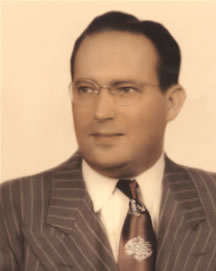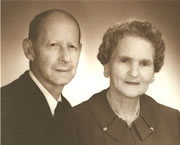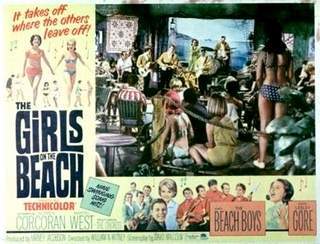
Our Benefactor, Sam Levin
His Vision. Our Mission.
To tell you how we began, we must first share with you the story of our benefactor, Sam Levin. His is a rags-to-riches story about a born entrepreneur who could recognize trends before everyone else and follow those trends to success. If you are a Dayton native, we encourage you to take a trip down memory lane to see how Sam Levin may have touched your life personally.
Sam Levin was the second oldest of the five children born to in the United States to Morris and Molly Levin. Morris and Molly were fleeing an anti-semitic Eastern Europe when they immigrated from Russia and Lithuania, respectively. During this time, Russia's government turned their backs as Jewish families were forced to leave their homes, with their possessions and land given to non-Jewish families. When Morris escaped, he hid in a hay wagon to avoid capture by the Russian troops.
The oldest of Morris and Molly's children, Dave, started Levin Tax Service which is still in business today. Next came Sam, founder of what came to be known as the Levin Family Foundation. Mardelle, the middle child, was the only girl. Last are Lou and Al, twins who serve on the board of the Levin Family Foundation.

Sam Levin orginally entered the professional world as an attorney after receiving his law degree from the Ohio State University, but only practiced a few years before deciding to enter the more exciting world of business. In 1943, Sam started his first business with his brother Dave-a wine store on Third St. in Dayton, OH back before alcohol could be purchased in grocery stores. Later, Sam purchased some old farm land and constructed a drive-in theater and trailer park, the Sherwood Twin Drive-In. Other business ventures included: The 49er (a successful fast-food restaurant like Arby's) and The Rhino (a Polynesian-themed restaurant which failed miserably).

In 1964, Sam, thinking he could improve on the quality of the movies he was showing at his theaters, wrote a movie called Girls on the Beach which is still running today due to its cult popularity in a niche genre market. Sam and Al Levin both had minor roles in the film, playing beauty contest judges. The movie was shot in two weeks for a budget of $50,000, and it featured stars such as Leslie Gore, The Beach Boys, and The Crickets. It was later sold for $250,000.
Sam's movie theater empire consisted of seventeen theaters in the Greater Dayton area--thirteen drive-ins and four in-house. If you are a Dayton native, you will probably recognize: Kon Tiki on Salem Ave., Cook Theater on Main St., and the Dixie Drive-In on N. Dixie ( which is still owned and operated by the Levins today).
Sam's biggest financial success actually happened when he was in his sixties and seventies through dealing commodities futures. He was decisive, and reacted nimbly to the market and capitalizing on it.
Sam was fearless. His work ethic was unparalleled. He lived humbly so the thought of losing money would not have hurt his lifestyle very much. He always thought of the most strategic way to proceed in his business dealings. He also didn't let the lack of money keep him down, instead thinking of cheap and easy ways to get things done. If a venture failed, he would learn from his mistakes and making improvements, never making the same mistake twice.
The Levin Family Foundation was founded out of a charitable trust Sam Levin had created to be funded upon his passing. Sam grew up poor, and he liked to think he did his part to lessen the suffering of the less fortunate through the donations he made during his lifetime. The Sam Levin Trust had no particular mission, Sam left that decision up to his family. For the first five years after Sam Levin's passing, the Sam Levin Trust was administered by an attorney and two family members who were all very busy businessmen. Funds were dispensed to worthwhile causes, but there was no clear mission in mind because Sam had left no plans for execution.
In the late 90s, Karen Levin (mother of Lou Levin's only child, Ryan), took the Sam Levin Trust to a new level of professionalism and accountability. She introduced the idea of the Levin Family Foundation to involve more family members and create an opportunity for the Levin family to become more philanthropically aware. In 2001, Karen was elected the Executive Director of the Levin Family Foundation. Under her direction, external advisers were used as resources for topics such as ethics, policies & procedures, and strategic planning. A mission statement was created which provided guidance to put the funds to best use to achieve the goals of the foundation.
